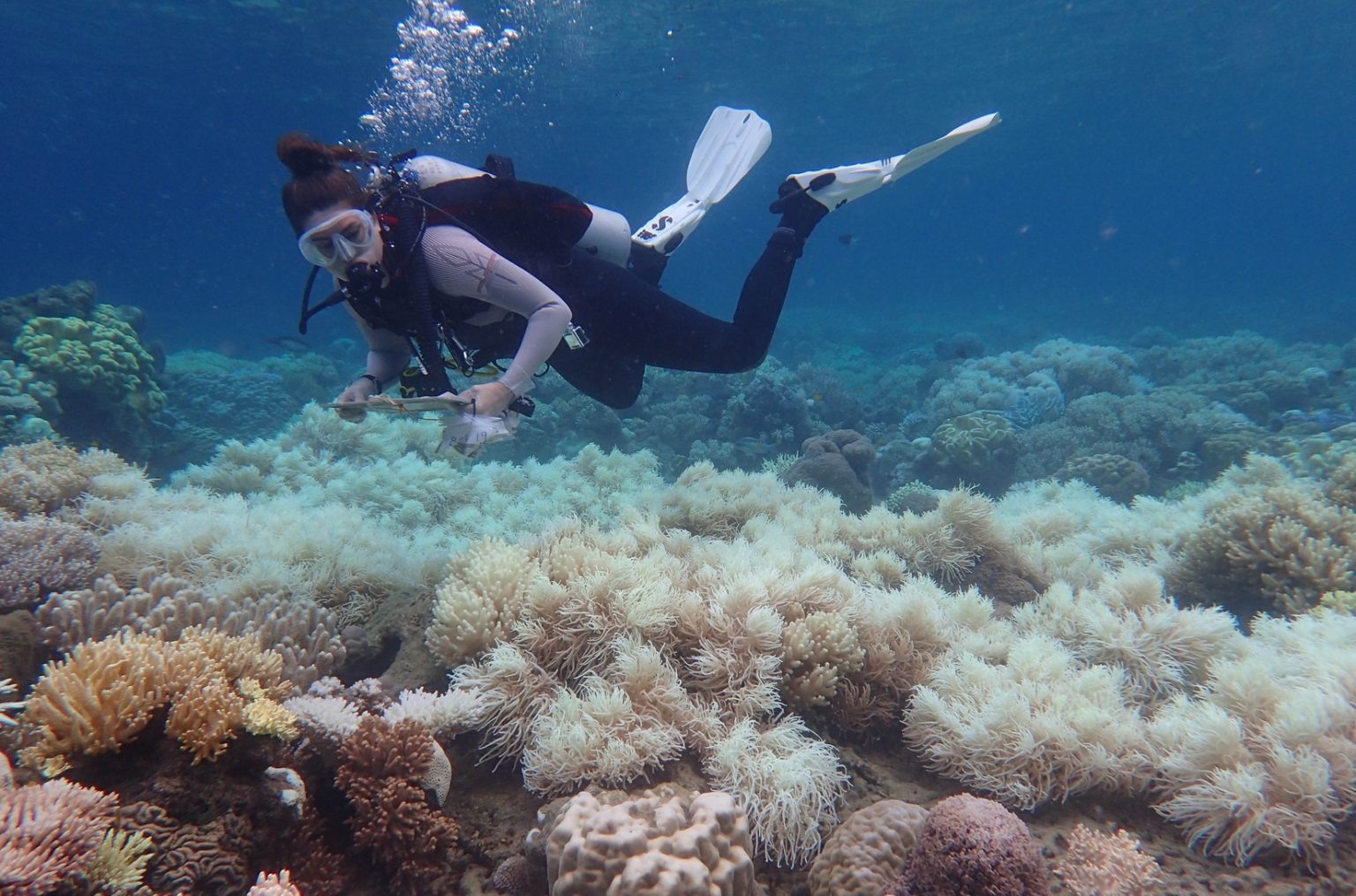The Great Barrier Reef is experiencing mass coral bleaching for the second consecutive year, ushering in another global round of headlines above images of ghostly white corals and dying habitats.
About a quarter of all the corals on the reef died from the 2016 event, mostly in the pristine north.
What were once dazzling multi-colored homes for myriad marine species are now graveyards of algae-swamped coral.
Now the reef is bleaching again, with corals in the reef’s central area, popular with tourists, suffering the most. It’s too early to say how many of the corals will die from the bleaching.
But fear not. Breitbart’s resident climate science denier James Delingpole is on the case.
With his trademark cavalcade of insults and lack of understanding, the British writer has been working hard to rid the reef of all this death and destruction by typing angry sentences into a computer.
“The Great Barrier Reef isn’t in the remotest danger,” writes Delingpole in his latest Breitbart story. Under the headline, “Only Gullible Fools Believe that the Great Barrier Reef Is Dying,” Delingpole writes that those who accept the evidence are “pillocks,” “idiots,” and “eco loons.”
Delingpole’s piece is mainly an attack on a recent paper published in Nature and its author, Professor Terry Hughes of James Cook University in Queensland.
Hughes’ paper examined the 2016 bleaching and also previous episodes in 2002 and 1998.
Delingpole tries to convince his readers Hughes is “the main man behind the scare” and accuses him of being “more interested in generating headlines than pursuing the scientific method.”
Delingpole ignores how Hughes had more than 40 co-authors on the study, with scientists from the Great Barrier Marine Park Authority, the Australian Institute of Marine Sciences, the U.S. National Oceanic and Atmospheric Administration (NOAA), and several leading universities. The science linking human-caused global warming to mass coral bleaching is well established.
Delingpole doesn’t really have any of his own arguments for his latest piece, but instead relies on a retired college tutor and migratory bird expert from California, Jim Steele.
Delingpole quotes heavily from an article on Steele’s website, which claims the Hughes study is based on “aerial surveys” that “cannot discriminate between the various causes of bleaching.”
The problem with this is that Steele is flat out wrong. As the Nature study clearly states, the analysis was based on “aerial and underwater surveys” combined with satellite data.
As Hughes told DeSmog by email:
“Steele needs to actually read our Nature paper. We reported the extent of bleaching, measured both from the air and underwater — the latter on 150 reefs.
Mass bleaching due to thermal stress is the only mechanism that can turn more than 1000km of a reef system white in the course of a few weeks.
In the Nature paper, we show the relationship between thermal stress experienced on each reef and the amount of bleaching recorded underwater by divers. We also ground-truthed the accuracy of the aerial scores, and found them to be highly reliable.
We also showed that satellite measurements of heat exposure matched the aerial bleaching scores as well as the underwater scores. The south didn’t bleach in 2016 because it was cool, the north was the most severely bleached because it was hottest.”
Coral bleaching is a stress reaction and at a local level can have multiple causes, including poor water quality.
But multiple studies in scientific journals have found the kind of widespread mass bleaching of corals witnessed since the late 1990s is caused by increasing ocean temperatures.
Delingpole claims that bleaching is “normal” during El Nino years when global temperatures tend to be higher. He doesn’t mention that the current bleaching unfolding across the reef is not happening in an El Nino year and that in any case, before the late 90s reefs around the world routinely experienced El Nino years without mass bleaching.
Delingpole reports Steele’s claim that rather than heat stress, the bleaching could be caused by falling sea levels. Steele points to a study of corals in Indonesia.
Hughes says:
“The Indonesian study shows that coral branches on inter-tidal reef flats that stick 15cm out of the water on an unusually low tide can get their tips burned off. That has nothing to do with why corals bleached four times along the Great Barrier Reef, in the four hottest years on record. Two of the mass bleaching events, 2002 and 2017, were not during El Nino conditions.”
Delingpole’s misrepresentations don’t stop there. He writes: “And no, bleaching isn’t the same as dying. Not in the slightest,” clarifying something that coral scientists also like to clarify.
For example, as Hughes’ James Cook University colleague marine biologist James Kerry said in a press release: “Bleached corals are not necessarily dead corals, but in the severe central region we anticipate high levels of coral loss.”
Hughes adds: “We have always distinguished between bleaching and mortality. The latter takes longer to unfold.”
Just two days ago in The Conversation, Hughes wrote:
“Last year (2016), following the peak temperatures in March, on average 67% of the corals died in a 700 km-long northern section of the Reef; the single greatest loss of corals recorded to date on the Great Barrier Reef. Further offshore and further south, most of the bleached corals regained their colour after the 2016 bleaching, and survived. The patchiness of the bleaching means that there are still sections of the Great Barrier Reef that remain in good condition.”
Like Delingpole, Steele also happens to deny the evidence that humans are causing dangerous climate change. He’s written a book on it.
So far a couple of thousand people have shared Delingpole’s story on Facebook.
Gullible, much?
Main image: A diver off Orpheus Island on the Great Barrier Reef survey’s bleaching in March 2017. Credit: Greg Torda/James Cook University
Subscribe to our newsletter
Stay up to date with DeSmog news and alerts







